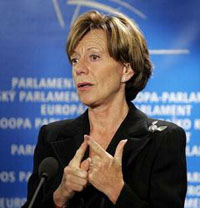U.S. criticism of court decision over Microsoft's case unacceptable

EU antitrust chief Neelie Kroes said Wednesday that a U.S. official's criticism of an EU court ruling dismissing Microsoft Corp.'s monopoly abuse appeal was "totally unacceptable."
Kroes said it was wrong for a representative of the U.S. administration to criticize "an independent court of law outside its jurisdiction."
"The Europe Commission does not pass judgment on rulings by U.S. courts and we expect the same degree of respect from U.S. authorities on rulings by EU courts," she said. "It is absolutely not done."
U.S. Department of Justice assistant attorney general for antitrust Thomas O. Barnett said late Monday that the U.S. had a particular interest in the Court of First Instance decision and was concerned that the legal standard it set had "the unfortunate consequence of harming consumers by chilling innovation and discouraging competition."
Kroes said if parties directly involved in the case - Microsoft - wanted to contest the ruling it could appeal to the EU's highest court, the European Court of Justice. It has two months to lodge a challenge.
She had been keen earlier in the week to stress that EU regulators consult regularly with U.S. authorities on antitrust cases - despite their sometimes different approaches - saying she would discuss the case with them when she visits the U.S. later this month.
The court ruling on Monday affirmed the EU's nine-year pursuit of Microsoft Corp., rejecting the software maker's appeal and strengthening the bloc's hand as it pushes ahead with cases against other major technology companies.
It said the European Commission was correct in concluding that Microsoft used its dominance in desktop computers to muscle into server software and media players in the 1990s and upheld a record EUR497 million (US$613 million) fine imposed on the company in 2004 - the largest ever levied by EU regulators.
The EU started investigating Microsoft in the late 1990s with complaints from Microsoft's U.S.-based rivals - including Sun Microsystems Inc. and RealNetworks Inc. - about how the software giant used its presence on most desktop computers to elbow into new markets and block competitors. Microsoft Windows operating system runs as much as 95 percent of the world's PCs.
Subscribe to Pravda.Ru Telegram channel, Facebook, RSS!


